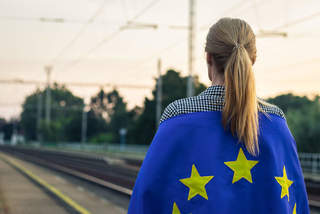
© AdobeStock
German EU Council Presidency: Leading Europe out of the crisis
When the plans gathered momentum at the end of 2019, there was hope that Germany could focus on legislative work with the new EU Commission and the new European Parliament. Now, the German EU Council Presidency is dominated by the COVID-19 crisis. Meanwhile, Europe is facing an unprecedented economic slump and sharply rising national debt, with a growing economic gap between the EU member states.
The core challenge at the beginning of the German Presidency will be to strengthen the cohesion of the EU. In the weeks and months to come, discussions on the multi-year EU financial framework - including the EU reconstruction instrument "Next Generation EU" - as well as the negotiations on future relations with Great Britain after the Brexit will shape the German Presidency.
Options for the German EU Council Presidency
In times of COVID-19, the continuity and effectiveness of the Council's work must be ensured. What is in any case demanding in view of the large number of explosive Commission proposals, 27 member states and a Council secretariat of manageable size will become a logistical nightmare due to the COVID-19 measures: restricted travel, "social distancing" rules and limited decision-making options via video and telephone conferences will make negotiations and the legislative process considerably more difficult. The expectations of our European partners are clear: If one country can master this task, it is the Federal Republic of Germany.
However, the political scope for the Council Presidency is limited - despite high public expectations. The political agenda is set by legislative proposals of the European Commission and decisions of the European Council (ER). Since 2009 the Council has had a permanent president - the media-suitable meetings of the heads of state and government no longer fall within the sphere of influence of the Council Presidency. Nevertheless, the temporary presidency is not a toothless tiger: the Federal Government can prioritize Council agendas and arrange informal Council meetings or events according to topic. These are all possible starting points for political influence.
Industry expectations: focus on economic comeback
Placing the European economic recovery and the overcome of the COVID-19 crisis in the centre of the German presidency is the fundamental way ahead. The agenda contains numerous growth-relevant priorities, such as deepening the internal market, implementing the industrial and digital strategy, and a resolute foreign and trade policy.
The negotiations for a multi-billion-euro program for the reconstruction of Europe are particularly ambitious and must be concluded quickly. The European economy needs massive support immediately. The longer the negotiations drag on, the higher the wave of insolvencies will swell. The 150 billion euros in loans for strategic industries proposed by the EU Commission are far from sufficient to comprehensively strengthen European industry.
The German government also wants to push ahead with the Green Deal. The aim is to shape progressive climate and environmental policy in an economically balanced and socially just manner. The federal government will be judged by this claim: The German Council Presidency must shape the Green Deal into a genuine growth program. Above all, it must be clarified whether and how the enormous tightening of the already ambitious 2030 target is to be achieved in such a short time, namely to reduce greenhouse gas emissions by 50 to 55 percent.
In addition, issues such as building modernization, investment in smart and sustainable mobility and low-cost renewable energies should also be promoted. Above all, the economy needs a changed EU subsidy law that combines ambitious climate protection with competitiveness and additional investments even in times of crisis.
Strengthening the EU's position in world trade
In addition, the Federal Government is striving for an effective Union to promote a partnership-based and rules-based international order. Above all, the EU needs a holistic strategy against rampant protectionism. The German Council Presidency should give priority to supporting the reform of the WTO, bringing the EU-Mercosur free trade agreement to a signing ceremony and seeking a united European response to all questions of unfair competition with China's state-run economy.
In implementing the Presidency programme, it is important that all measures contribute to the internal and external strengthening of Europe. It is already clear that the 25 page Presidency programme contains some departmental requests - such as an EU Action Plan to strengthen corporate responsibility in global supply chains - which are not even due for negotiation in the Council in the second half of the year due to the pandemic.
As BDI, we would like to use our expertise to provide constructive support for the discussions on the measures to be taken. In the paper "Leading Europe out of the crisis" we have formulated, in addition to our basic priorities, what listed groups and medium-sized family businesses expect from politicians in terms of the concrete initiatives to be taken to ensure that Europe emerges stronger from the crisis.



